Little Rutabaga and I left my folks' house in Sacramento on Sunday, and drove along the levee road, watching the river, and listening to an audio tape of Stuart Little, which probably doesn't need any advertising, but, in my opinion, should be regarded as one of the masterpieces of 20th century fiction. Little Stuart is as complex as any literary hero: he's gutsy and self-assured enough to win a toy sailboat race in his first time at 'sea', but also so proud that he misses his chance with the first woman he meets who shares his diminutive stature. At first I thought Stuart's predicament – as the mouse child of human parents – was a metaphor for homosexuality. Stuart is a bit of a dandy, meticulous in his grooming and manners, carrying a small cane within his first few weeks of life, and with none of the loud, messy habits of his 'normal' older brother, but I gave up that theory at the point in the story when he falls for the bewitching songbird, Margalo. Stuart's status as an outsider is a classic theme, subject to a number of interpretations, but I shouldn't try to make his story mean too much. I enjoyed it more when I was just enjoying the understated, dry storytelling of E.B. White. Please, no one tell me if he had some horrible skeletons in his closet because he was really super writer.
The tape ended (in a wonderfully ambiguous conclusion) just as Ru and I got to Locke, a small town in the Sacramento Delta that is still entirely made up of the wooden homes and businesses that were constructed there in the early 1900's. Some of the old buildings haven't been maintained much in the last 30 or 50 years, but most are still habited in one way or another. There are a lot of art galleries now, Al the Wop's bar (full of bikers) seems to be doing well, and the Locke Garden restaurant was very busy. Even though Locke is completely authentic in its original construction, it's not a tourist version of an oldentymestown. There are no Locke t-shirts for sale, no saltwater taffies, no spinning rainbow windsocks. For a few dozen people, Locke is just home.
I lived in Sacramento for 6 years, but I'd never been to Locke or any of the other agricultural towns in the Sacramento Delta. I'd never even driven through, and it's only about an extra half hour to get back to Oakland that way, along 160, the levee road, to Highway 24. At Dai Loy, now a museum but once one of a number of casinos in Locke, the attendant told me that she hears that all the time. Even folks who drive along 160 to Antioch don't stop much.
Of course, there's not so much to see while you're there. Locke is literally two streets and even though my parents warned me that it was tiny, I was still surprised. The houses and businesses are built neatly and closely in two small rows, maybe because in 1914 when Locke was founded, Chinese-Americans weren't allowed to own land, and the town founders had to lease their little chunk of property from George Locke, a white farmer who owned the land.
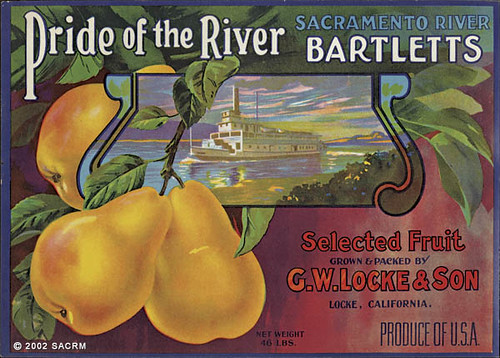
Actually 'grown and packed by' Chinese, Japanese, and Philippino laborers paid a dollar and maybe a meal for each day of work.
Locke is the only surviving all-Chinese rural town in the United States. It was built during the depression, after the Chinatown in neighboring Walnut Grove burned down. Unlike many Chinatowns where distinct ethnic groups of Chinese immigrants lived together, speaking different languages (dialects = languages, or at least, the difference between a dialect and a language is arbitrary), sometimes competing for control of various resources, Locke was settled and occupied almost exclusively by immigrants from the Zhongshan region in China. It lacked the tension that, in other communities, sprang up between competing and ethnically separate Tongs. (Kind of like competing mob families, Tongs tended to control the prostitution, gambling, and opium sales in the community.)
Gambling was a major part of Locke's economy. At one point there were 3 separate casinos featuring lotteries, various Chinese betting games, and later, Blackjack tables. Locke also had five brothels (at times the only businesses in town owned by white people) and during prohibition, a couple speakeasies.
Despite the vice-filled main street, lots of folks raised their kids in Locke. Most residents lived on the second street, behind the business district. With the river right there, kids had a great time fishing and swimming and playing outdoors. Because they were Chinese, most were forced into the segregated Delta schools (until WWII when the internment of Japanese-Americans reduced the number of students at the Asian schools to the point that they couldn't stay open). In the afternoons, after public school, Locke kids went to the Kao Ming School, where they got instruction in their language and culture. The school went through a couple incarnations, and finally closed permanently in the '80s when there weren't enough Chinese kids around to keep it going.
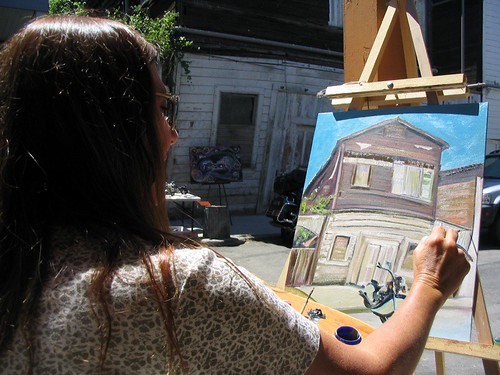
Martha Esch painting the old Star Theater. She's got a gallery in town and hosts studio painting sessions and other events there.
Rutabaga and I spent a couple hours in Locke, eating Mu Shu vegetables at the Locke Garden Restaurant (housed in the town's oldest building), and checking out the art galleries and bikers. I'm not sure if bikers are a regular feature of the town or of this was just a big rally weekend. Feel free to let me know members of the biker community. The streets were surprisingly full for such a little place, but of course nothing like in its hayday.
At its peak, Locke had hundreds of residents. During pear season, and on certain weekends, more than a thousand people stayed in the rooming houses, gambled in the casinos, ate at the restaurants, and shopped in the markets and dry goods stores. Now, the Chinese populations is around 10. I saw one Chinese-American guy in town, a biker at Al the Wops. Most all of the young people of Locke moved away to bigger cities – many going to college and mainstreaming into the larger culture. The folks who stuck around got older. Most have died.
I just finished reading a lovely oral history of Locke, with photos accompanying the stories of the elderly residents. Written and photographed in the 70's and early 80's by James Motlow, a white guy who had lived in Locke, along with a co-writer Jeff Gillenkirk, and Connie Chan, a Locke native who worked as their interpreter for the project, Bitter Melon presents a range of experiences: the relatively successful men who got work as foremen or ran the local businesses, the women who worked in local canneries and often had to leave their kids to fend for themselves, and the dollar-a-day laborers who never made enough to get married and start families, go back to visit parents in China, or to move out of the little town as it shrank away.
In the 80s, a Historic American Buildings Survey documented the town. The whole report is worth checking out, especially the photo series of the town.
Finally, and I probably should have put this first, you should check Locke's own website. You can see photos of just about every building, and read about the galleries and historic sites that are there now.
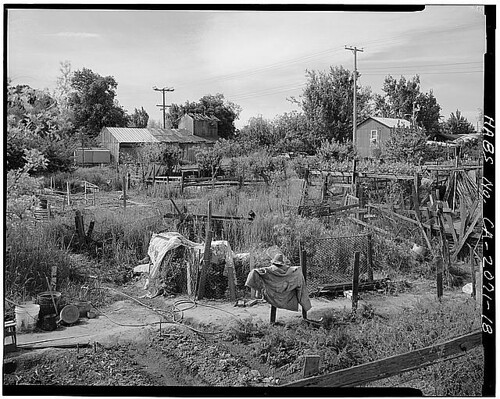
The community garden behind the town of Locke, from the Historic American Buildings Survey of the National Park Service.
On the way back to our car, Rutabaga and I passed a family trying to resolve some engine trouble outside of their home on Locke's second street. They seemed to be immigrants too, Latin American not Chinese, as Mexican and other Central American immigrants are now the main laborers along the Delta and throughout our country's agricultural sectors. A couple of visiting painters were packing up their little canvases of Locke's scenic buildings and getting ready to drive off too. Ru and I pulled out onto the road. Not north (like Stuart Little), but (like him) I somehow felt I was headed in the right direction.
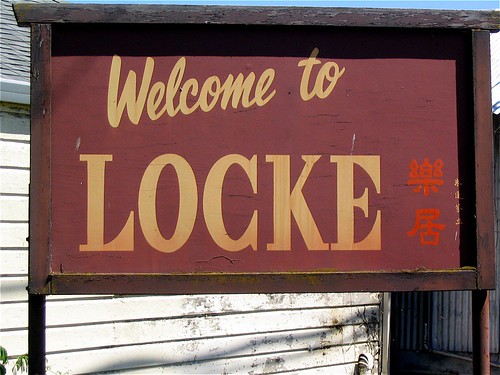
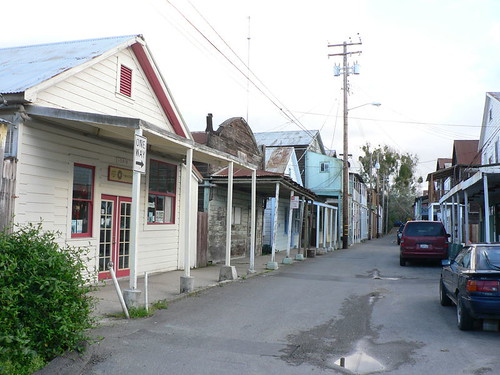
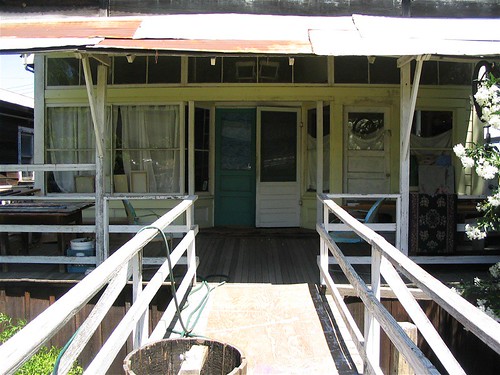
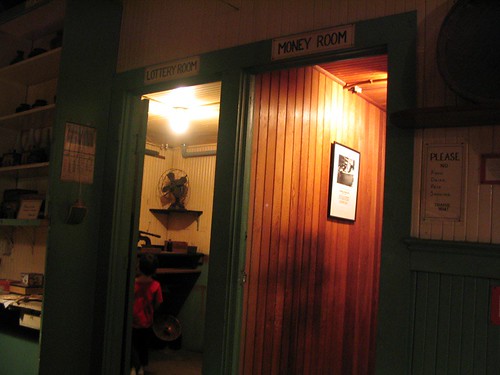
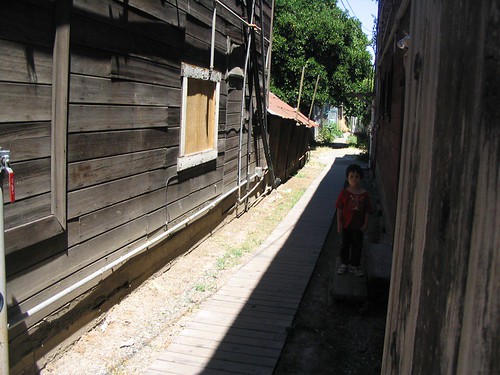

6 comments:
Thanks, Felix. This was a fascinating vignette -- I know so little about the delta, so reading about a unique Delta town was particularly interesting. I love the Stuart Hall intro too, BTW.
This is super-interesting, and I love all the photos too. Any thoughts on the bar name, "Al the Wop"? Isn't "wop" an old derogatory slang word for "immigrant" (w.o.p. = with out papers). Could this be a remnant of the town's history? Though I thought "wop" was usually used in reference to Italians, not Chinese. Do you know?
Great piece, thanks!
Just thought I'd add that in a relatively recent development, the people of Locke are finally able to own their own land - Sacramento County bought the whole town and is now arranging to sell it to the people who've lived on it for generations, so the can borrow money to make improvements, etc. (If I remember correctly)
Have to mention that if you're feeling a little hunger or thirst, the magnificently un-P.C.saloon and restaurant "Al the Wop's", complete with a ceiling covered with dollar bills and genuine scruffy river ambience, is a MUST VISIT! :)
By the way, I guarantee that Al is Italian!
Thanks all!
Interesting about the city buying the land. I think I'd heard that it was now property of the redevelopment agency or something, but I didn't know the details. Sounds like a positive development.
And ya, the 'wop' was Italian. Oh, how times have changed....
Hi Felix, this is Jimmy from Hyphen. On behalf of all the editors and myself, thanks for the coverage on Locke.
Post a Comment